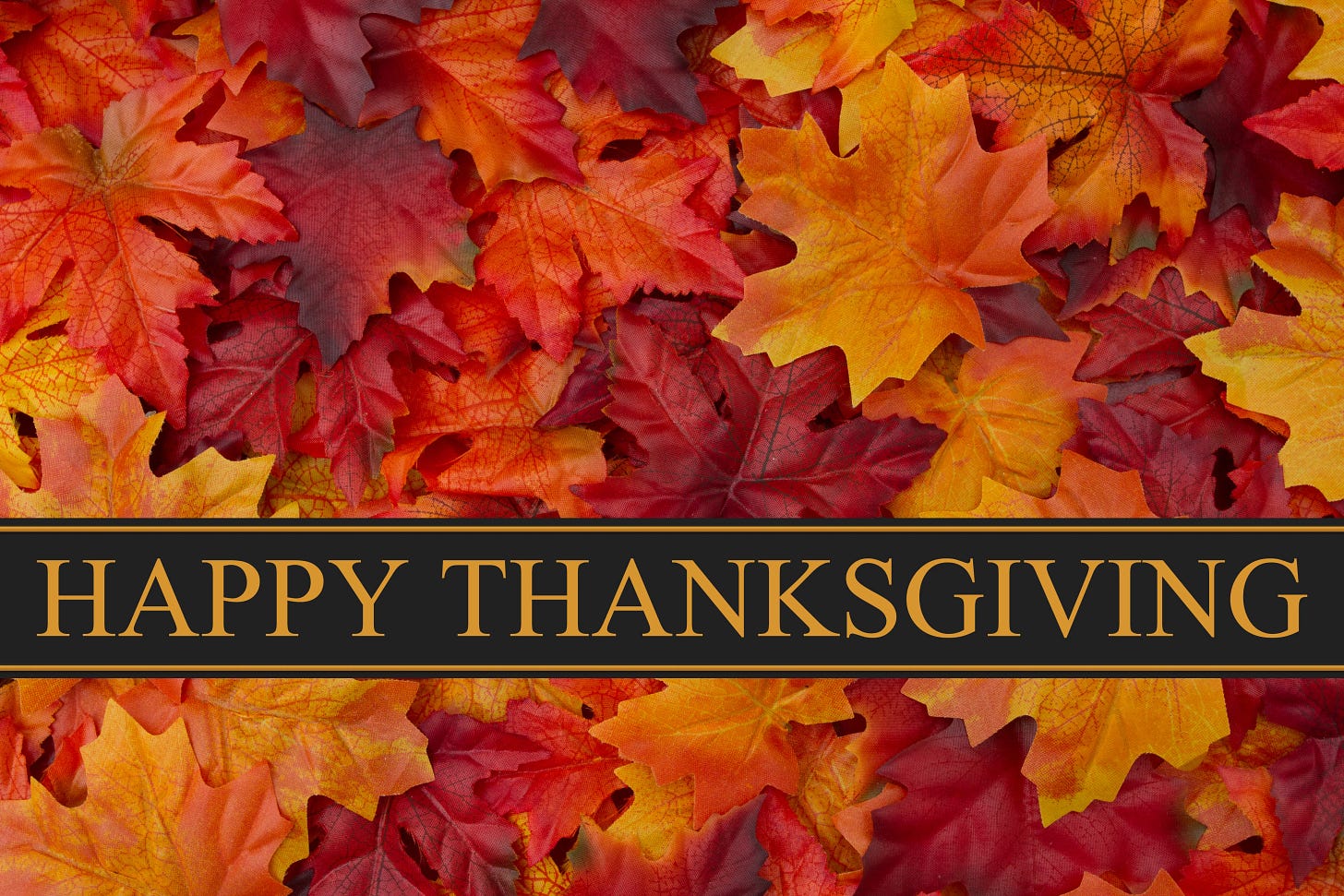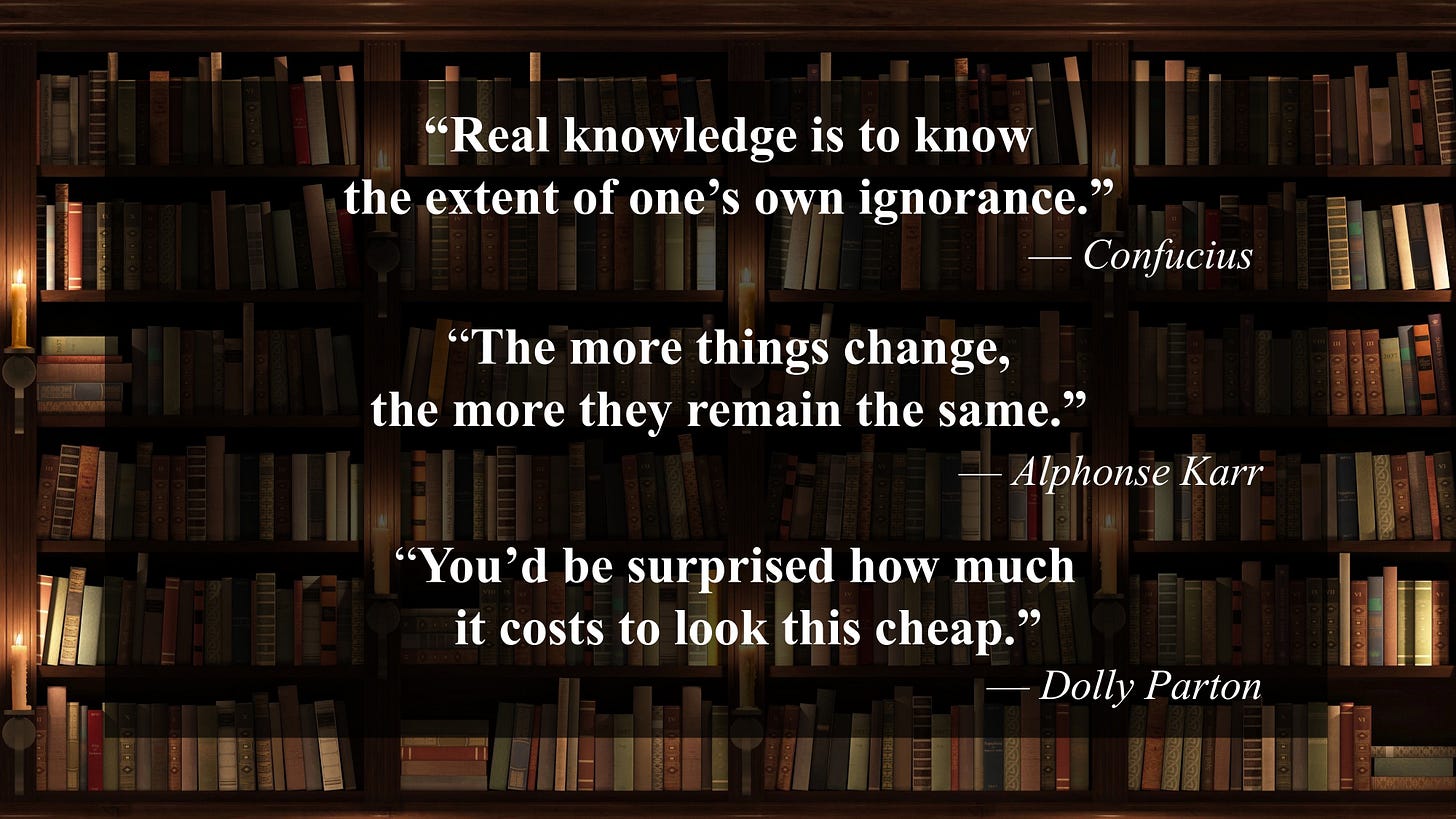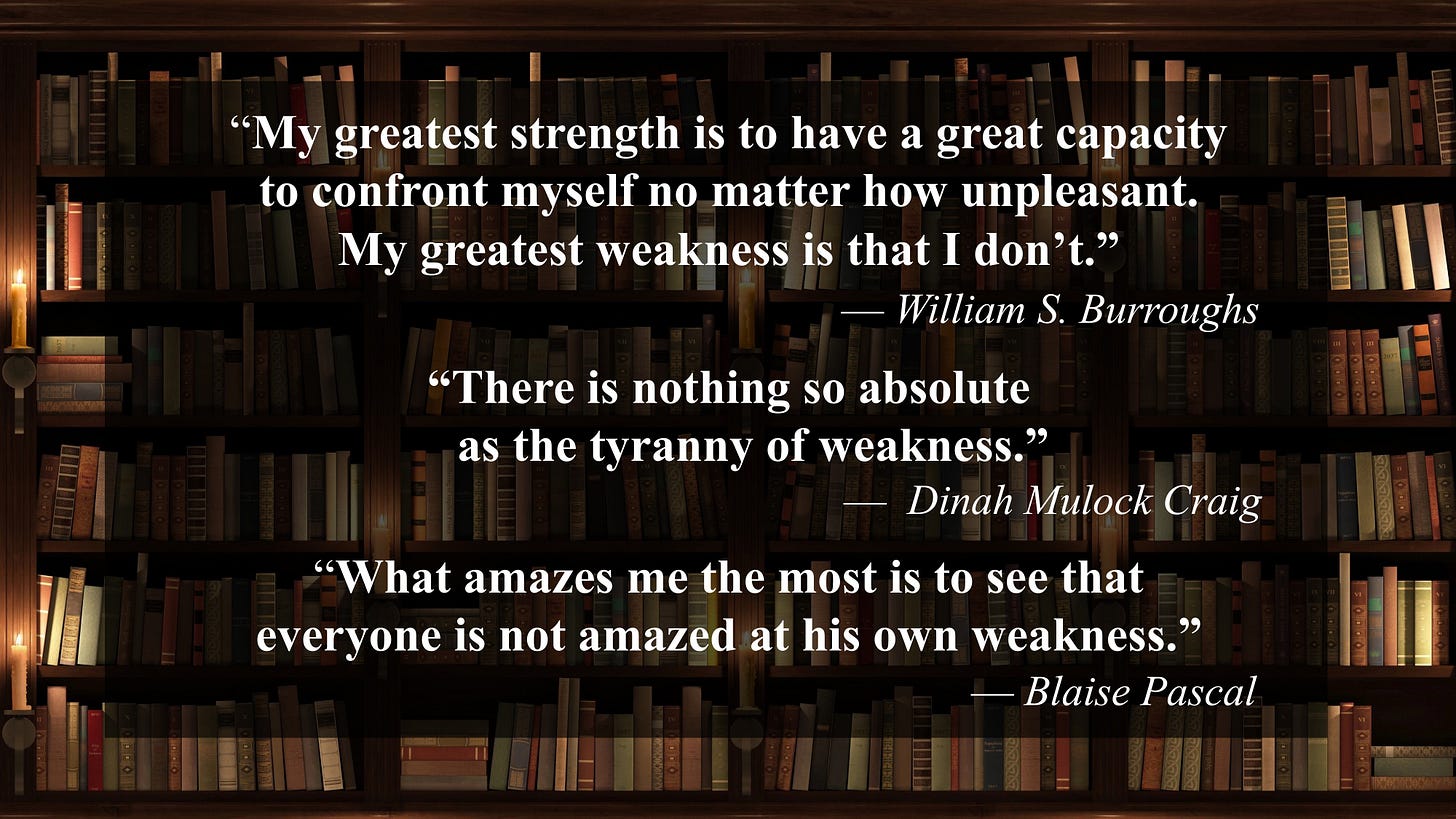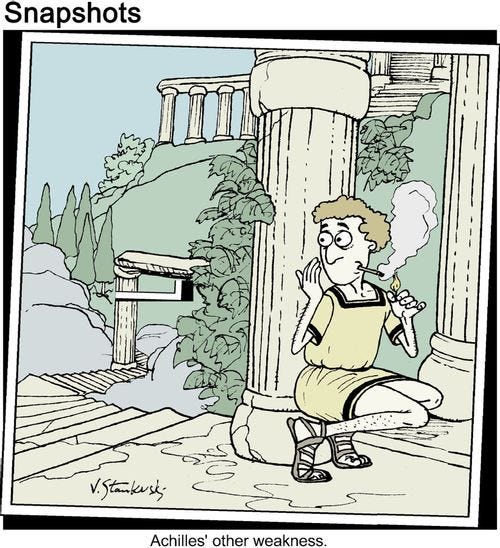Dr. Mardy's Quotes of the Week ("Strong Weaknesses")
Nov. 24—30, 2024 | THIS WEEK'S THEME: “Strong Weaknesses"
Harvest festivals, traditionally occurring at the end of a year’s growing season, have been celebrated all around the world for millennia. In Britain, such celebrations go back to pagan times, and early English settlers in North America brought the tradition with them to the New World.
In America, all the elements of the modern holiday originated after a particularly bountiful harvest in the Plymouth Colony in 1621, when Pilgrims shared a feast with a local Native American tribe of Wampanoag Indians. For the next 150-plus years, annual Thanksgiving celebrations were common in all the American colonies.
In 1789, the first year of his presidency, George Washington declared Thursday, Nov. 26th as “A day of public thanksgiving and prayer, to be observed by acknowledging with grateful hearts the many and signal favors of Almighty God.”
As the years passed, new proclamations from subsequent presidents announced different months and days, but in 1863, Abraham Lincoln appeared to give the date some stability when he proclaimed the last Thursday in November as the official date of the holiday.
Over time, though, confusion erupted whenever the month of November had five Thursdays, a phenomenon that occurs every five or six years. In 1941, Congress settled the matter for good by making the fourth Thursday of November the official date of the American Thanksgiving holiday.
Opening Line of the Week
We’re immediately pulled into the story for a simple reason: when we hear that someone has only one weakness and that person also has a tendency to get carried away, we can be sure that trouble will generally result.
For over 2,000 memorable opening lines from every genre of world literature, go to www.GreatOpeningLines.com.
This Week’s Puzzler
On November 19, 1909, this man was born in Vienna, Austria. After receiving a doctoral degree in law at the University of Frankfurt, he worked briefly as a journalist before fleeing to England in 1933, just after Adolph Hitler’s rise to power. In 1937, he moved to the U. S., where he worked as a consultant to British banks and as a correspondent for British newspapers. Like so many immigrants, he said the highlight of his life was taking the oath of U.S. citizenship in 1943.
He became a professor of management at New York University in 1950, a position he held until 1971. From then until his retirement in 2002 at age 92, he was a management professor at California’s Claremont Graduate School. Often called “the father of modern management,” he was history’s most influential management theorist, and the first to be called a “management guru.” He never liked the term, though, once saying:
“We are using the word ‘guru’ only because ‘charlatan’ is too long to fit into a headline.”
In his career, he wrote dozens of management books, but his most influential work was Management: Tasks, Responsibilities, Practices (1973). He was much more than a business writer, though, writing two novels and scores of essays on a wide variety of topics.
His writing was characterized by a directness of style, an eloquent simplicity, and, occasionally, a wry sense of humor. More than any other business writer I’ve read, he had a remarkable ability to turn a phrase. In a 1980 article in the journal Manage, he offered this provocative thought on people in positions of power:
Who is this person? (Answer below)
What Is Your Strongest Weakness?
The concept of a strong weakness is one of history’s best oxymorons, right up there with jumbo shrimp, pretty ugly, and, according to some, military intelligence. In common parlance, an oxymoron is a two-word phrase that is literally a contradiction in terms. Twenty years ago, I explored the subject in a book titled Oxymoronica (2004).
Many oxymorons are imbedded in popular sayings, like Shakespeare’s “Parting is such sweet sorrow” or Ava Gardner’s “I am deeply superficial.” And sometimes—in what is called “a juxtaposition of opposing ideas”—they’re at the heart of longer, more complex observations:
Oxymoronic observations are also commonly described as paradoxical, which the dictionary defines as “A statement that seems self-contradictory, false or absurd, but is nonetheless well-founded or true.” A famous example is “less is more,” first authored by Robert Browning, but made popular by the German-born architect Ludwig Mies van den Rohe.
Ideas like less is more and strong weaknesses also have one other important quality: they are so provocatively phrased that they are examples of what G. K. Chesterton said was “Truth standing on her head to get our attention.”
This week’s Mystery Man first introduced the concept of strong weaknesses in The Effective Executive (1967), when he argued that it was foolish to believe that “there are ‘well-rounded’ people who have only strengths and no weaknesses.” He added:
“Strong people always have strong weaknesses too. Where there are peaks, there are valleys.”
While he didn’t develop the idea much further, over time his observation evolved into an explanation about why otherwise effective people fail. Now regarded as a truism in management literature, it goes something like this: unless we find a way to manage or compensate for our strong weaknesses, they will dramatically hamper our effectiveness, or even lead to our failure.
In my many “Effective Leadership” seminars over the years, I often posed the question, “Have you ever seen a CEO or top executive whose career was significantly damaged or even completely ruined by a strong weakness?” Generally, almost all participants quickly identified at least one example—and many, multiple cases—leading me to conclude that this was a common phenomenon in organizational life.
In those discussions, it also became clear that the strong weaknesses that brought people down covered the waterfront of human frailty—sex, alcohol, drugs, gambling, hubris, jealousy, insecurity, denial, and overreach, to name the most common. But what also emerged was that many traits we commonly regard as great strengths, when carried too far, become strong weaknesses. There are numerous examples, but they include confidence that evolves into arrogance, persistence into stubbornness, ambition into ruthlessness, firmness into rigidity, and an optimistic, positive outlook into denial.
As I reflect on my own life, I would say that one of my strongest weakness has been a pronounced inattention to the small but important details of life. I’ve never balanced a checkbook and, despite my great love for libraries, have rarely returned a borrowed book on time. In addition, over the years, I’ve failed to pay estimated taxes, incurred extra charges for bank overdrafts, paid unnecessary late-fee penalties, forgotten birthdays, anniversaries, and other important dates, and missed medical, dental, and other appointments because I failed to write them down. There are other examples as well—some too embarrassing to mention—but one stands out in my memory.
In the early 1970s, I went through a difficult and emotionally draining divorce. One day, well before seat belts were mandated by law, my two young children were playing in the back of my VW bus when I heard a police siren approaching from behind. Even though I had no idea why I was being pulled over, I noticed the kids getting a little fidgety and assured them that there was nothing to get alarmed over. After I brought the van to a stop and rolled down my window, the officer said, “I’m sorry, sir, but your car tags have expired. Can I see your driver’s license, please.” As I reached for my wallet, the kids were getting even more upset, so I once again tried to calm them down.
After handing my driver’s license to the patrolman, he looked at it and said, “I’m sorry, sir, but your driver’s license has expired as well.” I knew this was a violation that often resulted in a car being impounded, so, after mumbling something pathetic about going through a painful divorce and this being the worst year of my life, I noticed the officer’s eyes turning to my kids, now both whimpering and probably wondering what was going to happen to them after their daddy was arrested. The officer leaned over and quietly whispered in my ear, “I’ve been there.” As he handed my license back, he said loud enough for my kids to hear, “Not a problem, sir. Take care of this tomorrow. Have a good day.” I will never forget the kindness that officer extended to me in that moment.
Over the years, I’ve often offered the rationalization that I’m a Big Picture as opposed to a Small Detail person, but the truth is that my longstanding failure to pay attention to the small-but-important details of life is nothing more than a strong weakness. And, to be precise, I should say that it was my strongest weakness, for I no longer struggle with the problem. What’s my secret? I wish I could say it was sheer determination and force of will, but in 1991, I had the brilliant foresight to marry a woman whose super-high attention to detail perfectly complemented my greatest weakness. Ever since, we’ve forged the perfect yin-yang relationship—and I heartily recommend the method to anyone engaged in the process of mate selection. And while it it true that I still miss an occasional appointment or fail to pay a bill on time, my life is a far, far cry from what it was like several decades ago.
This week, as you reflect on your various liabilities, try to identify your strongest weakness. If you have trouble coming up with a clear answer, ask your spouse, any of your children, or even your best friend. Chances are, they will have little hesitation in pointing you in the right direction. Before doing anything, though, take a few moments to peruse this week’s selection of quotations on the subject:
All men that are ruined, are ruined on the side of their natural propensities. — Edmund Burke
Weakness is a great bully without knowing it. — Margaret Deland
Giants are not what we think they are. The same qualities that appear to give them strength are often the sources of great weakness. — Malcolm Gladwell
People with really weak characters cause an immense amount of suffering in the world. They destroy whole civilizations. — Bessie Head
Only the weak blame parents, their race, their times, lack of good fortune, or the quirks of fate. — Louis L’Amour
Weakness is the only fault which cannot be cured. — François, duc de La Rochefoucauld
Like all weak men he laid an exaggerated stress on not changing one’s mind. — W. Somerset Maugham
Our greatest weaknesses are always the flip side of our greatest strengths. — Judith Sills
Such is the weakness of our nature, that when men are a little exalted in their condition they immediately conceive they have additional senses, and their capacities enlarged not only above other men, but above human comprehension itself. — Richard Steele
The weak can be terrible because they try furiously to be strong. — Rabindranath Tagore
There is nothing more startling in human relations than the strong emotion of weak people. — Mrs. Humphrey Ward
For source information on these quotations, and many others on the topic of WEAKNESS & THE WEAK, go here. For quotations on the topic of STRENGTH & WEAKNESS, go here.
Cartoons of the Week:
Answer to This Week’s Puzzler:
Peter Drucker (1909-2005)
Dr. Mardy’s Observation of the Week:
Thanks for joining me again this week. Next week, I’ll be take a much-needed break, but I will be providing a freshly-updated version of a post I did exactly a year ago on the theme of “Adventure.”
Mardy Grothe
Websites: www.drmardy.com and www.GreatOpeningLines.com
Regarding My Lifelong Love of Quotations: A Personal Note












Another practical and valuable post, Mardy. Loved your story about the traffic stop. I've taught cops in criminal justice training and was advised when stopped to never act tough and say, "What's the problem?" Instead calmly say, "Officer, how can I help your?" Also if you're stopped by a patrol car, don't argue, admit your mistake, act humble. The patrol officer's job is to lecture you. However, if you are pulled over by a motorcycle cop, to quote an officer, "You're screwed." His job is to write tickets. Many thanks for your honest and insightful weekly posts as well as your many enlightening books.
In advising his clients where to place their efforts to improve, Dan Sullivan, The Strategic Coach, suggests that they concentrate on improving their strengths. If your strengths are particularly strong, then your weaknesses will pale in comparison. On the other hand, if you concentrate on improving your weaknesses, all that you will end up with are Strong Weaknesses!